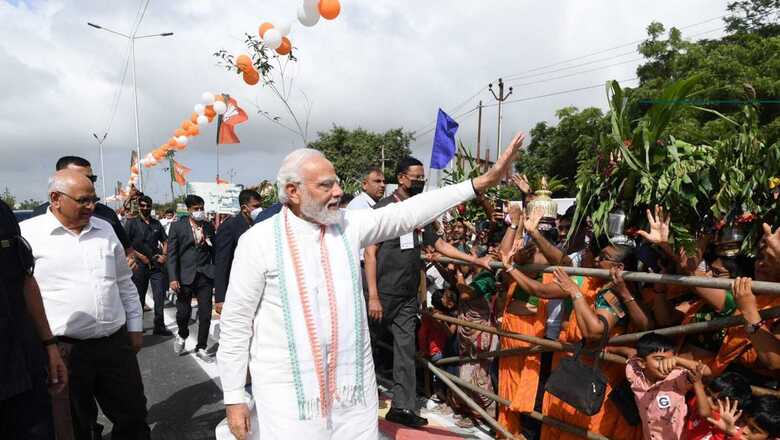
views
Anecdotes are often inadequate means to comprehend a phenomenon. Yet, they are frequently used for easy narration and to tell a complex story. In my book, The Architect of the New BJP: How Narendra Modi Transformed the Party (Penguin), I resorted to such stories to tell a tale of innovative methods of organisation-building developed by Narendra Modi.
In the course of my research, I heard many such stories that clearly delineated Modi’s personality as someone much ahead of the time. Take, for instance, Modi’s initiative to reform the power sector of Gujarat during his second stint as the chief minister — ahead of the 2007 Assembly elections.
Modi decided to separate the agriculture feeder from the electric supply for domestic and industrial use. As a result, the power supply for the agriculture sector in the state was reduced to four hours a day for irrigation purposes. In Saurashtra region, it evoked strong reactions from farmers, particularly in the Patel community, which has a sizeable population. An IAS officer working with Modi in those days later told me that he was alarmed at the reaction and went to the chief minister to persuade him about the ‘wrong’ timing of the reforms. Since the elections were around the corner, he thought the reforms could cost heavily in political terms. But Modi was unwavering and told him: “Don’t worry about the political fallout if you are convinced about the decision.”
Of course, Modi’s decision to have separate feeders for agriculture was guided by the larger cause of saving the posterity from an impending ecological disaster in water-stressed zones of Gujarat. In the 1990s, Gujarat had faced recurrent droughts and water shortages. The depletion of the underground water had reached an alarming level in Saurashtra where water mafias had come to thrive. Perhaps, there are few parallels where a political leader is unconcerned about his present but strives to protect the future.
As a journalist travelling extensively in the state, I too could not comprehend the logic of the decision that entailed serious political problems then. But a decade down the line, it was quite revealing to see how the landscape of Saurashtra, Kutch and other parts had undergone a change. Those who were critical of him then were now showering praises on Modi for having saved the water-stressed regions from an ecological crisis.
PM @narendramodi addressed the 108th #IndianScienceCongress today…here's a rare audio from his 1984 talk at the Sangh Shiksha Varg in Pune..Speaking on "Vartaman Bharat Ni Samasya", Modi lauded the contributions of eminent Indian scientists of the 20th century..Let's hear! pic.twitter.com/LcaNKFfNN0
— Modi Archive (@modiarchive) January 3, 2023
That he could envision the future and understood science and technology much ahead of the time was quite evident in his actions in the early 1990s. He introduced computers and most modern technologies in the party offices as an effective tool of organisation-building even when computerisation evoked resistance from trade unions and the political ecosystem.
His propensity to appreciate the strength of technology was far deeper than the mere use of some gadgets. This was narrated to me by a doctor who as a son of a BJP leader met Modi in those days as a student of medical science. Modi asked him about his studies and then advised him to study biotechnology which would be the future of medical science.The doctor still recalls that he was not aware of ‘biotechnology’ then. It was many years later that biotech became all the rage. What is more notable is that Modi’s understanding of science and technology is aimed at forging a unique compatibility between nature and human creativity.
Renowned political scientists Lloyd I Rudolph and Susanne Hoeber Rudolph, in their book, Postmodern Gandhi and Other Essays, which aims to unravel the Mahatma’s multifaceted personality, describe ‘Gandhian professionals’ as a distinctly different category from “professional revolutionaries and political specialists”. Professional revolutionaries developed out of French or Bolshevik revolutions whereas political specialists came from the experience of competitive democratic politics in Western Europe or America. ‘Gandhian professionals’ were different from the two as they insisted on social service while employing non-violence as a tool and remained suspicious of political power. In the Rudolphs’ assessment, the Gandhian professional embodies the qualities of professional revolutionary and political specialist yet maintains a distinct character.
Perhaps, a close scrutiny of the spectrum of Modi’s political actions would easily categorise him into a fourth category which incorporates the best of the above three categories and still retains its own distinct identity. He comes across as a revolutionary as well as a gradualist depending upon the contexts in which we see him. He is also a political specialist in the strict sense of the term as he has been using power as an effective instrument for the service of people. Similarly, he is Gandhian to the core when it comes to imbibing the ethical contents of Gandhian politics — thriftiness, punctiliousness, attention to detail, and devotion to service. Yet, Modi retains his distinct imprimatur of being a moderniser who is not averse to industry or infrastructure development and giving a determined push to development.
As I have stated at the beginning, anecdotes give nothing but a mere glimpse of a phenomenon like Modi. In contemporary politics, he often emerges as enigmatic as Mahatma Gandhi was in his time. He is seen in terms of contrasts even though his political life is full of conciliation rather than confrontation. Much like Gandhi focused on organisation-building in South Africa and subsequently in India (in the case of Indian National Congress), Modi’s project of transforming the BJP into a robust political organisation which is capable of representing diverse Indian social cross-currents is yet another example of his perspicacity to prepare it for a future beyond individuals.
Of course, as history is the ruthless analyser of the past, it would be best to leave it to the posterity to comprehend this unique political phenomenon. But there is no doubt in my mind that Modi’s unparalleled understanding of Indian social psychology and his unique skills of conciliating with varied social and political forces invariably put him in the league with great political personalities endowed with incredible foresight.
Ajay Singh is Press Secretary to the President of India. Views expressed are personal.
Read all the Latest Opinions here



















Comments
0 comment